- Home
- Charles L. Grant
Riders in the Sky - [Millennium Quartet 04] Page 5
Riders in the Sky - [Millennium Quartet 04] Read online
Page 5
But the hints and clues kept coming, and he couldn’t ignore them: a huge white-haired man dressed in black seen in this small town, or in that place barely large enough to make it on a map. Because they had no real time reference for the sightings, they had just about covered every state east of the Mississippi and south of the Mason-Dixon; because they kept hearing stories about the giant who preached wherever someone would listen, they kept moving.
They have nothing else to do.
They have nowhere else to go.
Cora digs the pit for their evening fire; he sets out the sleeping bags and rummages through what’s left of their larder. Pretty skimpy, he realizes, deciding on a couple cans of vegetables and one can of soup. Tomorrow they’d have to stop at the next town and, if it wasn’t battened down against strangers, see what they could do to pick up more. If necessary, get a job for a week or so. They have gotten good at that, too.
“Steak,” he says.
“What?”
He winces, not realizing he’s spoken aloud. He fusses with the contraption he’d made a long time ago, a collapsible cooking frame that fits over the fire for their one small pan, their one small pot. “Sorry. Just daydreaming.”
“Some day,” she tells him, making it sound like a promise.
They eat, they don’t speak, they make sure the fire is out and the utensils cleaned and put away before crawling into their sleeping bags to stare at the sky.
He’s almost asleep, when Cora whispers, “That guy.”
“Huh?”
“That guy we met last year. The one in West Virginia, remember? Broken arm? Looked like he’d fallen down a mountain? We gave him some money. Remember?”
He does; he doesn’t want to.
“You ... you said he was different. Like Chisholm.”
Even though she can’t see him, he nods. “Yeah.”
“Why, Reed? Why was he any different than us?”
“I’ve told you a hundred times, Cora, I don’t know. Soon as I saw him I just knew.”
Something dark flies under the few stars they can see; in the trees something shifts, it sounds like feathers.
His left hand nudges her hip, and she slips her right hand into his. It’s the way of it these past few months, falling asleep holding hands. For reasons they can’t explain, it’s better than an embrace.
A car on the interstate backfires twice, and she squeezes his fingers suddenly and so tightly he has to bite down on his lip to keep from making a noise. It’s something they’ve never gotten used to, the guns that came out when the famine was at its worst and people all over defended their pantries, when the plague mushroomed with neither rhyme nor reason and the guns came out to keep the odd-looking away.
He’s almost asleep again, when she whispers, “It’s changed, Reed. It’s not the same out there. Or is it just me?”
A hopeful note he sours when he says, “No. I know what you mean.”
And it has changed.
What there is now, everywhere they’ve been, from everything they’ve seen in newspapers and on television, is an intensity that’s almost terrifying in its strength. It didn’t take some people long to put together the several disasters that had occurred over the past half decade, then fit them together and come up with some version of Armageddon. Even the doubters learned to keep their opinions to themselves, and those who urged calm and reason have at last run out of reasons why death and famine and plague and war have nothing to do with prophecies that aren’t confined to any one religion’s Bible.
A simple thunderstorm sends people screaming into the streets, cowering behind locked doors, pouring into houses of worship not necessarily Christian.
And it’s all one step away from a violent explosion.
“Reed?” Cora says, a little girl voice.
“Yeah?”
“Where is he?”
“An island, Cora. That’s all the dream says—he’s on an island. And he’s close.”
* * * *
4
1
A
lmost autumn; just twilight.
Streetlights and porch lights make Camoret seem very much smaller under a sky that has turned on every star it can find; a comfortably cool breeze that gives just the right touch to the season without forcing sweaters or heavy jackets out of the closet; cats making their way through the trees toward their prey; the muffled cough of a gator at the edge of the swamp; the muffled sputter of an old engine as a small boat made its way around South Hook to the island’s only public marina.
All under a moon more white than silver.
* * * *
2
Along the one-mile business district on Midway Road an alley separated every office and shop, bar and restaurant; behind each building was a shallow parking area for owners and employees, widening onto another paved alley that ran the length of each block. The buildings themselves tended more toward wood than brick, but all were sturdy, decades of reinforcement against the storms that blew in from the sea or across from the mainland.
Across the street and two doors south of the sheriffs department, the light from a nearby streetlamp sparkled off a hand-painted arc of Old English lettering whose metal-flaked gold paint had been specially designed to glow as if afire. The script was difficult enough to read in the first place; most days, once the sun began to wester, it took sunglasses and some hard puzzling to figure out that the letters spelled Camoret Weekly.
Tonight a man stood in the window, hands clasped behind his back, his pointed chin up. Lean without appearing frail. His solid grey hair, which nearly matched his grey suit, was thick and brushed straight back from a smooth high forehead split by a widow’s peak. Deep-set eyes. Thin dark lips pursed and ready for debate. The only color on him was his bow tie, and it was a suitably subdued maroon.
A glance to his right, at an antique brass pendulum clock on the wall, and Whittaker Hull shook his head in resigned disapproval.
He’d been standing here for nearly an hour, and not once had he seen a patrol car or that ridiculous white Jeep of Oakman’s pass in either direction. He had, on the other hand, seen a handful of tourists already half in the bag and it wasn’t even nine, a gang of teenagers streak past on skateboards that seemed to have rockets attached, and one thunder-loud drag race between a vintage Ford and something that looked pieced together from the worst scrapyard in the state.
It was a crime.
Hell, there’d been several crimes, and not a single sign of the Law.
He rubbed his chin thoughtfully, wishing absently as he did that he hadn’t shaved off his beard. He had hoped it might make him look a little younger; all it did, he was sure now, was make him look like a corpse.
Suddenly Dub Neely appeared on the sidewalk in front of him. Standing at attention, eyes front, chest out, stomach in. An abrupt broad grin, a mocking salute, and he marched away, arms swinging stiffly, lips pursed in an unheard whistle.
Now that, Whittaker thought, is a damn crime on two wobbly legs. Remembering seeing the fool being driven away by the sheriff two days ago, he automatically began to write his next editorial.
There was property and people to protect, a standard of conduct to maintain, and Oakman had been with what could only be called the town drunk, the community disgrace, no doubt taking the rest of the afternoon off to hunt for flying saucers or talking dolphins or whatever else Neely’s pickled brain had conjured this time.
“Do you realize,” he said, his voice graveled and deep, “that the world is going to hell in a custom-made handbasket, yet still we must continue to cater to society’s dregs lest we be called heartless, inhumane, and without a single divine drop of human compassion?”
No one answered.
He tipped back on his heels, rocked forward, tipped back.
“Were this an election year, we might better understand Sheriff Carnivale Oakman’s interest in the demented ravings of a man who, if rumors are correct, was once considered an esteemed educator somewhere deep in our heartlan
d, but is now little more than a walking and most persuasive advertisement for the immediate repeal of the repeal of blessed Prohibition.”
No one answered.
He tipped back, rocked forward. Cleared his throat.
“But it is not an election year, and we must therefore puzzle over the sheriffs priorities. War has broken out in this fragile world of ours, a war that pits the decent against the indecent, the law-abiding against the law breaker, the moral against the immoral. We are under siege here on Camoret Island, our families in peril, our businesses on the verge of bankruptcy, our society on the verge of dissolution. With alarming frequency the dregs of the mainland make their way to our haven, yet our law enforcement guardians persist in pursuing the trivial, investigating the inconsequential, and ignoring the pervasive danger, thereby flushing our hard-earned tax dollars straight down the drain.
“Explain yourself before it’s too late, Sheriff Oakman, before the voters of this island take a second searching look at the real man behind the badge.”
He sniffed, nodded once, and turned away from the window just as his stomach began to growl, reminding him that supper was long overdue, and once again he hadn’t bothered to stop work for a bite to eat. The newspaper may only be a weekly, but unlike his predecessor, he did not treat his position like a hobby.
For all the trouble it causes him with local merchants and politicians, he believes in what he does.
The room was knotty-pine paneled and comfortably small, just large enough to hold the room-wide counter for customers who wanted ads or subscriptions, a roll-top desk and padded swivel chair, a handful of filing cabinets. A green-shade lamp on the desk provided the only light. In the back wall an open doorway that led to his private office and the stairs that climbed to his apartment above.
“So what do you think?”
“Pompous,” a voice called from the back. “Pompous as all hell.”
“Of course,” he answered. “But will they like it?”
“Vale will string you up.”
“He understands my position. He will not take offense.”
“Not after he strings you up, he won’t.”
Hull rolled his eyes and stepped behind the counter, lowered the flap, and finger-dusted the smooth polished top. “You overestimate the power of my humble words.”
“Good. I’ll put that on your tombstone.”
He turned as a tall young woman glided into the office doorway, snug jeans and loose tartan shirt, red hair in rich waves settling like a cloud on her shoulders. If she wore makeup, it was too artfully applied to notice, and she looked so much like her mother that he sometimes had to hold his breath in case she was a ghost
In her right hand was a small tape recorder, which she looked at with distaste. “Seriously, Dad, you really expect me to transcribe all that hot air?”
“I do.” He leaned back against the counter.
“And what about Mayor Cribbs? That makes him look bad, too. Stupid, even, for backing Oakman all these years.”
“If the shoe fits,” he answered with a shrug. “Jasper is too cowardly to add to the department. Probably because Cutler won’t let him.” His expression twisted in disgust. “Oh, God forbid we should upset the blessed monied tourists who visit their little kingdom.”
“Later, then,” she said, and grabbed the door frame so she could swing back and drop the recorder onto her desk. As she did, he realized she wasn’t wearing anything on her feet.
“I can afford shoes, you know, Ronnie,” he said dryly.
“It’s still officially summer,” she reminded him, pulling a windbreaker from a peg just inside the door. “You know I don’t wear shoes in summer. Never have, never will. Besides,” she added, “they’d only get messed up anyway.” Another reach around the door, lower this time, and she held up a pair of well-used rubber wading boots. And grinned.
Hull straightened. “No.”
“Sure. Why not?”
He lifted his left hand, counted off on his fingers: “Snakes. Gators. Tetanus. Quicksand. Malaria.” Lifted the other hand. “Typhus. Did I mention snakes? Did I mention the Teague brothers? Did I mention,” he added with a pointed look at his watch, “that it’s getting dark out there?”
His daughter grinned again, crossed the room, and kissed his cheek wetly while she gave him a near-suffocating hug. “You’re sweet, Daddy,” she whispered, “but I can take care of myself. And there are no gators, it’s a saltwater marsh.”
“The Teagues,” he repeated when she pulled away. “Stump is a Neanderthal who’s just discovered fire, and his kin are worse. I’m surprised they haven’t sent someone over from Emory to study them.”
“I do have a gun, Daddy, you know. And the day I couldn’t shoot better than Stump Teague is the day I marry Dub. Okay? Okay.”
It wasn’t okay. It was never okay when his only child took herself into that damn wetland without someone along to watch her back. But she did it regularly anyway. She worked part-time for some damn office or other in the Department of the Interior, her job to keep track of the wildlife in the marsh. Hell, marsh; it was a goddamn swamp, he didn’t care what she said. All year round she tagged and counted the birds and the critters, noted the effects of the tides on water and salt levels, noted the damage done by hurricanes and winter storms, and wrote up enough reports every year to paper a barn.
A hell of a thing that she’s more comfortable in there than she was in town. Or with him.
“Your dinner’s in the oven, it’ll be done in ten minutes,” she called as she headed for the back door. “If I’m late—”
“If you’re late,” he called back, “I’m going down to Betsy’s, eat enough grease to explode my heart!”
Her laughter was cut off when the door slammed, and he looked to the ceiling as if, for a change, there might be some guidance up there, if maybe her mother had a ghostly word or two for him. A wince when he heard her gun the engine of her pickup, another when he heard tires screaming as she shot down the alley toward the side street three buildings down.
I take it back, he thought; she’ll never make it to the swamp alive.
But he couldn’t help a smile as he walked into the office, or a chuckle as he switched on his computer and waited for everything to get in its place. He had little idea how the thing actually worked, but Ronnie had showed him enough to allow him to search the world for the stories he printed every week.
The local stuff he gathered himself.
And right now, he didn’t much care about the world, no matter what the editorial would say; right now, he was more concerned with the island.
He opened a file only his daughter knew about, and scrolled through it slowly. It wasn’t as if his memory needed refreshing; he practically had it all memorized. But seeing it there on the screen, seeing it on paper whenever he printed it out, gave it a legitimacy that somehow didn’t exist when it was kept in his mind. Where it lived every night. In dreams. Fever dreams that infected his sleep and had him waking with sweat chilling the sheets, puckering his chilled skin, tasting like saltwater as it snaked past his lips.
In dreams not even his best sour mash could suppress.
His chair was on casters, and he pushed away from the desk. Stared at the screen, at summaries of reports he had picked up from the wire services and television. Wondered if he could turn that data into a graph, some kind of visual aid to make it more dramatic:
Sunday night in Ohio a carnival troupe had ridden into town and attacked a group of kids, some of whom had run wild through the carnival the night before. A small army, the police had said. It was like a small army had blown through, and they were helpless as the townspeople formed an army of their own. They were still counting the dead;
On Monday afternoon, in Louisville, a gang no one had known existed erupted in a bizarre turf war. Bizarre because they’d raided various stables in the area and did most of their fighting from the saddle. It lasted most of the night. They were still counting the dead;
<
br /> A state police substation besieged by a gang coalition just outside Houston; a service club in Tulsa turned a fundraiser blood bank drive game into a test of weapons and ammunition.
They were still counting the dead.
Just this morning Ronnie had reminded him that in any given year over the past decade there had been frequent outbursts of pocket violence, and he hadn’t been able to convince her that this was somehow different. He couldn’t prove it, he could only feel it, but this wasn’t the same.
Just as he knew that Camoret wasn’t the same either.
It had nothing to do with Cutler and his pet, Mayor Cribbs; nothing to do with whatever they were up to.

![[Oxrun Station] The Orchard Read online](http://i1.bookreadfree.com/i/03/17/oxrun_station_the_orchard_preview.jpg) [Oxrun Station] The Orchard
[Oxrun Station] The Orchard![Riders in the Sky - [Millennium Quartet 04] Read online](http://i1.bookreadfree.com/i/03/20/riders_in_the_sky_-_millennium_quartet_04_preview.jpg) Riders in the Sky - [Millennium Quartet 04]
Riders in the Sky - [Millennium Quartet 04]![Chariot - [Millennium Quartet 03] Read online](http://i1.bookreadfree.com/i/03/19/chariot_-_millennium_quartet_03_preview.jpg) Chariot - [Millennium Quartet 03]
Chariot - [Millennium Quartet 03]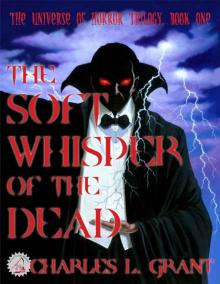 The Universe of Horror Volume 1: The Soft Whisper of the Dead (Neccon Classic Horror)
The Universe of Horror Volume 1: The Soft Whisper of the Dead (Neccon Classic Horror)![[Oxrun Station] Dialing The Wind Read online](http://i1.bookreadfree.com/i/03/19/oxrun_station_dialing_the_wind_preview.jpg) [Oxrun Station] Dialing The Wind
[Oxrun Station] Dialing The Wind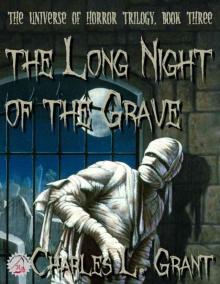 The Universe of Horror Volume 3: The Long Night of the Grave (Neccon Classic Horror)
The Universe of Horror Volume 3: The Long Night of the Grave (Neccon Classic Horror)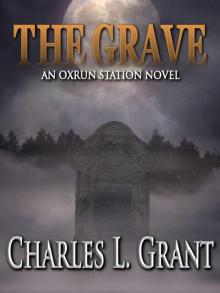 The Grave - An Oxrun Station Novel (Oxrun Station Novels)
The Grave - An Oxrun Station Novel (Oxrun Station Novels)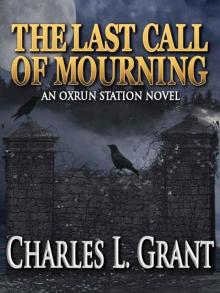 The Last Call of Mourning - An Oxrun Station Novel (Oxrun Station Novels)
The Last Call of Mourning - An Oxrun Station Novel (Oxrun Station Novels)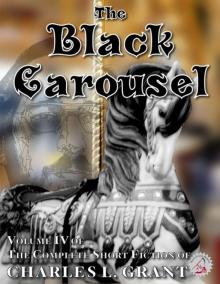 The Complete Short Fiction of Charles L. Grant, Volume IV: The Black Carousel
The Complete Short Fiction of Charles L. Grant, Volume IV: The Black Carousel The Bloodwind - An Oxrun Station Novel (Oxrun Station Novels)
The Bloodwind - An Oxrun Station Novel (Oxrun Station Novels)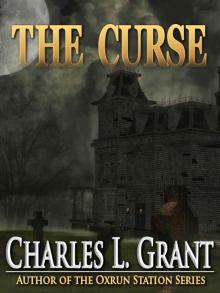 The Curse
The Curse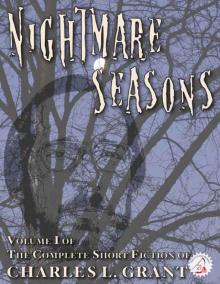 The Complete Short Fiction of Charles L. Grant Volume 1: Nightmare Seasons (Necon Classic Horror)
The Complete Short Fiction of Charles L. Grant Volume 1: Nightmare Seasons (Necon Classic Horror)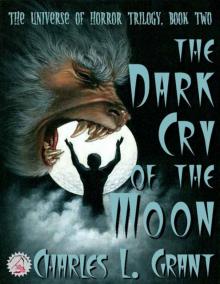 The Universe of Horror Volume 2: The Dark Cry of the Moon (Neccon Classic Horror)
The Universe of Horror Volume 2: The Dark Cry of the Moon (Neccon Classic Horror)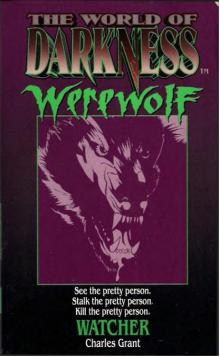 Watcher: Based on the Apocalypse (World of Darkness : Werewolf)
Watcher: Based on the Apocalypse (World of Darkness : Werewolf)![[Oxrun Station] The Bloodwind Read online](http://i1.bookreadfree.com/i/03/25/oxrun_station_the_bloodwind_preview.jpg) [Oxrun Station] The Bloodwind
[Oxrun Station] The Bloodwind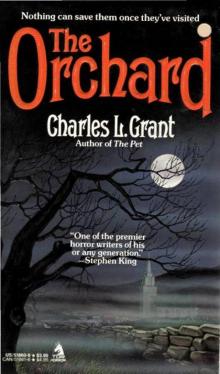 The Orchard
The Orchard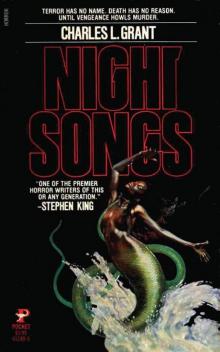 Night Songs
Night Songs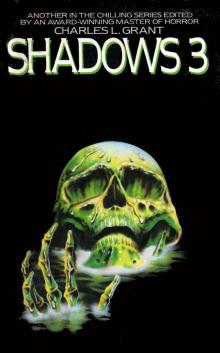 Shadows 3
Shadows 3![Symphony - [Millennium Quartet 01] Read online](http://i1.bookreadfree.com/i1/04/02/symphony_-_millennium_quartet_01_preview.jpg) Symphony - [Millennium Quartet 01]
Symphony - [Millennium Quartet 01] The Hour of the Oxrun Dead (Necon Classic Horror)
The Hour of the Oxrun Dead (Necon Classic Horror)![In the Mood - [Millennium Quartet 02] Read online](http://i1.bookreadfree.com/i1/03/31/in_the_mood_-_millennium_quartet_02_preview.jpg) In the Mood - [Millennium Quartet 02]
In the Mood - [Millennium Quartet 02]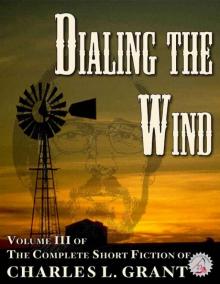 The Complete Short Fiction of Charles L. Grant Volume 3: Dialing the Wind (Neccon Classic Horror)
The Complete Short Fiction of Charles L. Grant Volume 3: Dialing the Wind (Neccon Classic Horror)![[Oxrun Station] The Last Call of Mourning Read online](http://i1.bookreadfree.com/i2/04/05/oxrun_station_the_last_call_of_mourning_preview.jpg) [Oxrun Station] The Last Call of Mourning
[Oxrun Station] The Last Call of Mourning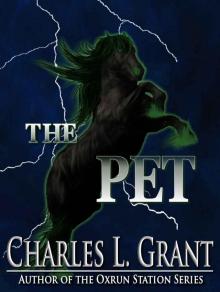 The Pet
The Pet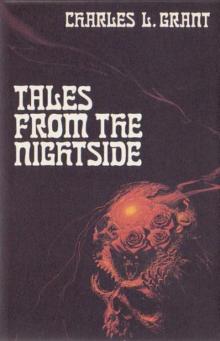 Tales from the Nightside
Tales from the Nightside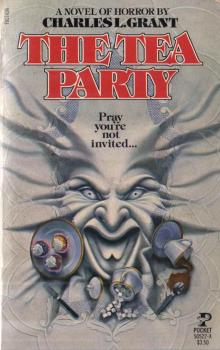 The Tea Party - A Novel of Horror
The Tea Party - A Novel of Horror The Complete Short Fiction of Charles L. Grant Volume 2: The Orchard (Necon Classic Horror)
The Complete Short Fiction of Charles L. Grant Volume 2: The Orchard (Necon Classic Horror) Whirlwind
Whirlwind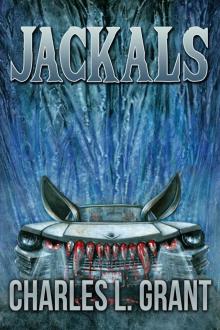 Jackals
Jackals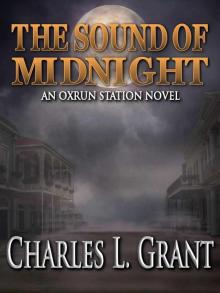 The Sound of Midnight - An Oxrun Station Novel
The Sound of Midnight - An Oxrun Station Novel